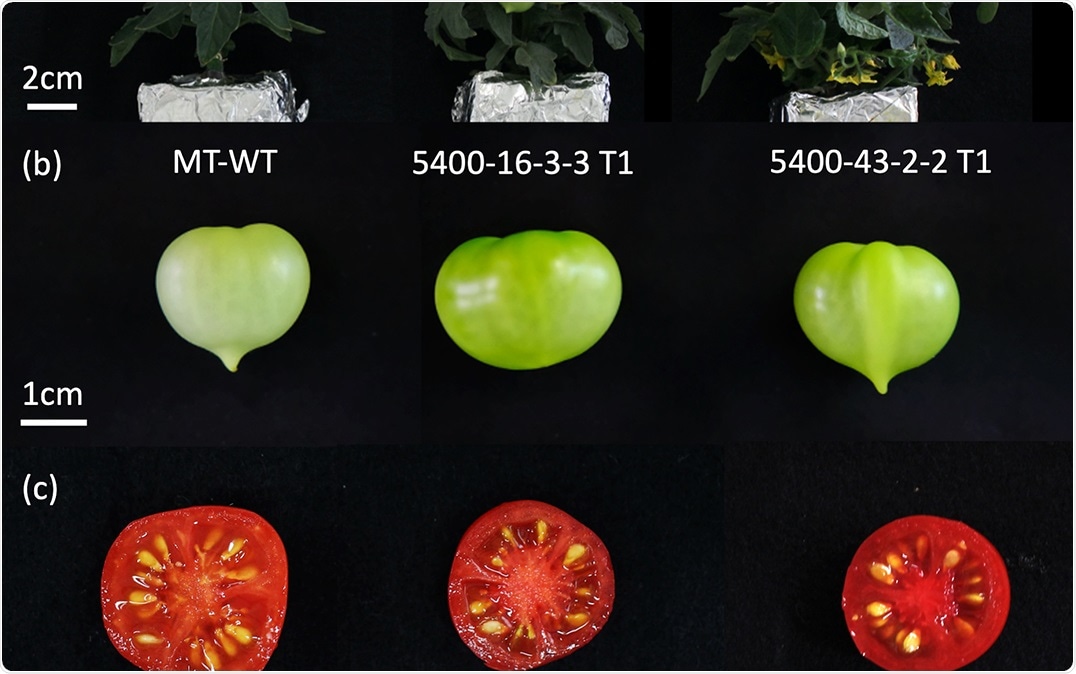Whether tomatoes are fresh, cooked, juiced, or sun-dried, they are arguably one of the most multipurpose fruits on Earth, and while tomatoes are mainly added to savory dishes, they are actually a fruit.

Tomatoes used in the experiment. Image Credit: University of Tsukuba.
Tomatoes became so popular that it resulted in the development of over 10,000 cultivars of different sizes, hues, and shapes. But fascinatingly, there is not much genetic diversity among today’s tomato varieties. This absence of diversity, combined with the fact that several traits are regulated by multiple genes, makes it a challenging prospect for tomato breeders to enhance the yield and quality of the plant.
However, in a new study published recently in the Scientific Reports journal, scientists headed by the University of Tsukuba described how contemporary gene-editing technology may be able to lend a helping hand to tomato breeders.
The tomato was the first genetically modified food to be approved for human consumption. However, many early transgenic varieties contained genes derived from other species, raising safety concerns among consumers. Therefore, coupled with the fact that most transgenic varieties showed only moderate improvements in quality, tomato breeding has, for the most part, moved away from transgenics.”
Hiroshi Ezura, Study Senior Author and Professor, University of Tsukuba
Modern gene editing techniques are different from standard genetic modification and do not leave a trace in the genome. They can induce slight changes inside a native gene, imitating natural variation.
Tomatoes typically contain comparatively high levels of carotenoids—the red, orange, and yellow pigments found in several plants. As precursors to vitamin A, carotenoids have anti-cancer and antioxidant properties, rendering them immensely significant to human nutrition.
Many natural mutations that improve the accumulation of carotenoids in tomatoes have been recorded; however, their introduction into commercial varieties is a complex and time-intensive prospect.
Therefore, a research team headed by the University of Tsukuba used gene-editing technology to reproduce the mutations of carotenoid accumulation in tomatoes.
Single nucleotide changes in individual tomato genes had previously been achieved using Target-AID gene editing technology. However, we designed a system whereby changes were simultaneously introduced into three genes associated with carotenoid accumulation.”
Hiroshi Ezura, Study Senior Author and Professor, University of Tsukuba
Among the 12 tomato lines that were obtained, 10 contained mutations in all the three target genes. Additional investigation of two tomato lines with the dark green fruit as well as purple roots of natural carotenoid accumulation mutants demonstrated high concentrations of carotenoids, especially lycopene, in the gene-edited plants.
This shows that it is possible to improve multigenic plant quality traits using gene editing technology, and opens up a whole range of options for improving the yield, shelf-life, nutrient content, and disease resistance of different crop plants, which has obvious benefits for both human health and the environment.”
Hiroshi Ezura, Study Senior Author and Professor, University of Tsukuba
Source:
Journal reference:
Hunziker, J., et al. (2020) Multiple gene substitution by Target-AID base-editing technology in tomato. Scientific Reports. doi.org/10.1038/s41598-020-77379-2.